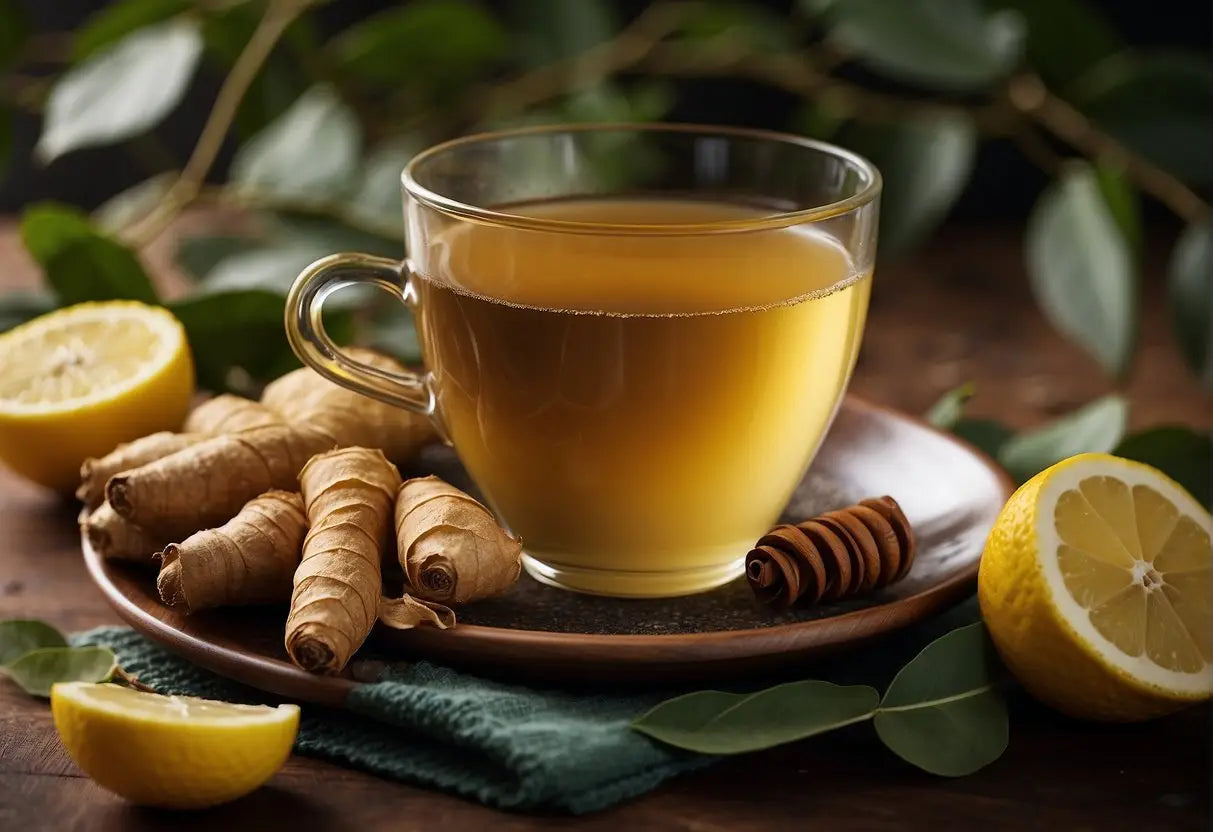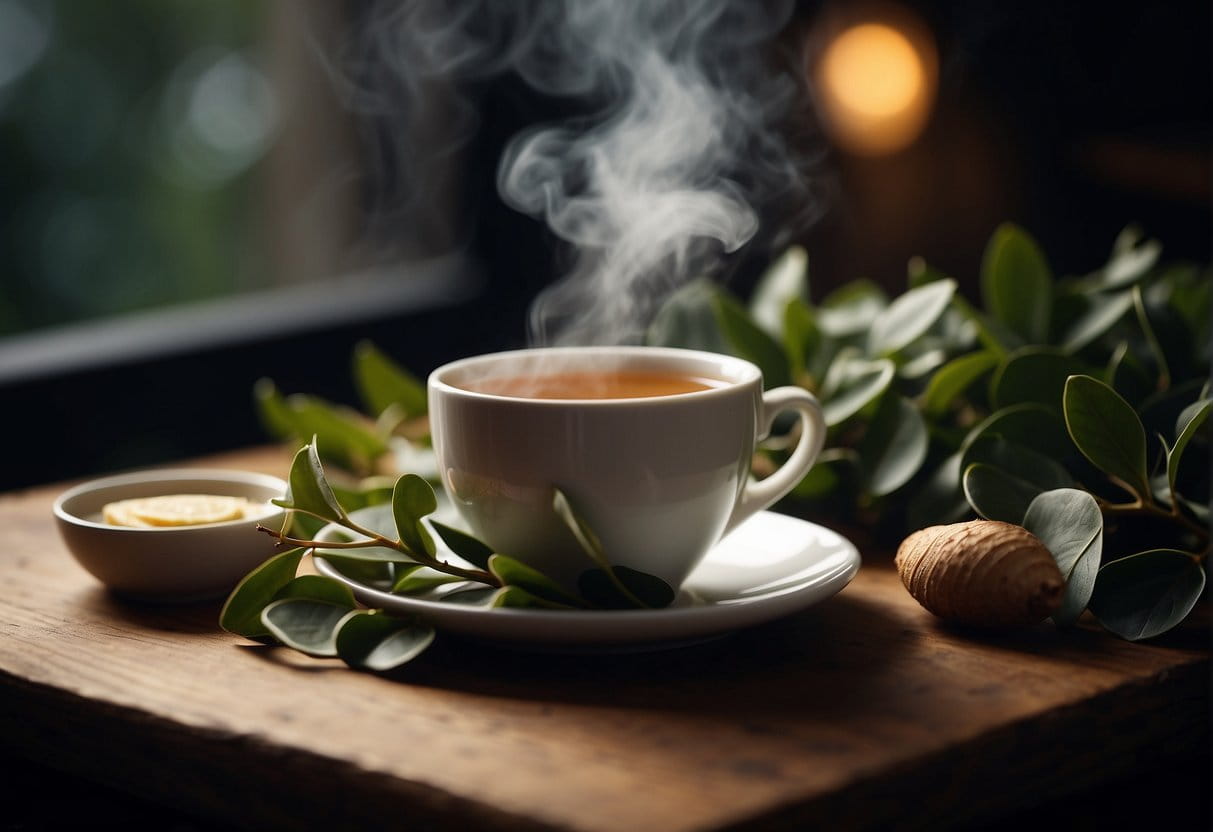Tea for Congestion
When you're experiencing congestion, sipping on a cup of tea may provide some relief. Tea for congestion is a traditional home remedy that can help to open nasal passages and reduce inflammation.
Types of Tea:
- Peppermint Tea: This tea contains menthol, which can act as a natural decongestant, helping to break down mucus.
- Ginger Tea: Ginger has anti-inflammatory properties that may help to soothe sore throats and alleviate congestion.
- Chamomile Tea: Chamomile can help in reducing inflammation and might have a mild sedative effect that aids in restful sleep.
Method of Action:
Bestsellers
- Hydration: Tea helps keep you hydrated, which is essential for thinning mucus and easing congestion.
- Steam: The steam from a hot cup of tea can help to open up nasal passages.
- Herbal Benefits: Certain herbs in teas have compounds that may assist in the reduction of inflammation and congestion.
Important Considerations:
- Always make sure the tea is not too hot to avoid burns.
- If you are pregnant or have underlying health conditions, consult with a healthcare provider regarding the best types of tea for you.
- Adding honey or lemon may enhance the benefits, as honey has antimicrobial properties and lemon contains vitamin C.
Remember, while tea can be a helpful adjunct for managing symptoms of congestion, it should not replace medical treatments if you are dealing with a severe cold or another health condition that's causing the congestion.
Best Types of Tea for Relieving Congestion

Several types of tea can help alleviate congestion. Herbal teas are known for their soothing properties, green tea contains beneficial antioxidants, and black tea can provide a comforting warmth.
Herbal Teas
Herbal teas, such as peppermint and eucalyptus, have natural decongestant properties that can help clear your nasal passages.
- Peppermint Tea: Contains menthol, which acts as a natural decongestant, helping to break down mucus.
- Eucalyptus Tea: The eucalyptus leaves can help reduce inflammation and relieve your congestion.
Green Tea
Green tea is packed with antioxidants, specifically epigallocatechin gallate (EGCG), which may reduce inflammation and assist in opening up your airways.
- Dose: Drinking 2-3 cups of green tea daily may provide relief.
Black Tea
The warmth of black tea can soothe your throat, while its steam helps open nasal passages. Black tea contains theophylline, which can help improve breathing.
- Preparation: Steep black tea for 3-5 minutes in boiling water for the best effect.
How Tea Alleviates Congestion

Drinking certain teas can help reduce the symptoms of congestion through their anti-inflammatory effects, steam inhalation benefits, and decongestant components.
Anti-inflammatory Properties
Green tea and black tea contain compounds such as catechins and polyphenols that have anti-inflammatory effects. When you consume these teas, they can help to reduce the inflammation in your nasal passages, leading to clearer breathing.
| Tea Type | Compound | Effect |
|---|---|---|
| Green Tea | Catechins | Reduces Nasal Inflammation |
| Black Tea | Polyphenols | Alleviates Swelling in Nasal Passages |
Steam Inhalation Effect
Inhaling the steam from a hot cup of tea can assist in loosening congestion in the chest and sinuses. The warm vapor provides a soothing effect and can help to open up nasal passages.
- Herbal teas such as peppermint or eucalyptus may be particularly beneficial due to their menthol content, which enhances the steam's effectiveness.
Decongestant Ingredients
Certain herbal teas contain ingredients that act as natural decongestants. Ingredients like peppermint, eucalyptus, and licorice root can help to break up mucus and reduce congestion.
Lao Ban Zhang
- Peppermint Tea: Contains menthol that helps clear sinuses.
- Eucalyptus Tea: Often used to treat respiratory issues.
- Licorice Root Tea: Has properties that ease coughing and reduce mucus.
Preparation and Brewing Techniques
Proper preparation and brewing techniques can significantly enhance the effectiveness of tea in alleviating congestion symptoms.
Steeping Times
- Green Tea: Steep for 2-3 minutes using water at 80-85°C.
- Black Tea: Steep for 3-5 minutes using water at 95-100°C.
- Herbal Tea: Steep for 5-10 minutes using water just off the boil.
| Tea Type | Temperature | Steeping Time |
|---|---|---|
| Green | 80-85°C | 2-3 mins |
| Black | 95-100°C | 3-5 mins |
| Herbal | 100°C | 5-10 mins |
Adding Natural Enhancers
- Honey: Stir in 1-2 teaspoons to add soothing properties and sweetness.
- Lemon: Squeeze in a wedge for vitamin C and to cut through the mucus.
- Ginger: Add a few slices for its anti-inflammatory effects.
- Soothes throat
- Natural sweetener
- High in vitamin C
- Helps break down mucus
- Reduces inflammation
- Aids digestion
Lifestyle and Dietary Considerations
Managing congestion can be significantly influenced by your lifestyle choices and diet. Paying attention to hydration and nutritional needs can support your immune system and help alleviate symptoms.

Hydration and Fluid Intake
Staying Hydrated: Adequate fluid intake is essential when you're experiencing congestion. Drinking warm teas and other hot beverages can help loosen mucus, making it easier for your body to clear it.
| Fluids to Include | Benefits |
|---|---|
| Herbal Tea | Soothes the throat, reduces inflammation |
| Warm Water with Lemon | Provides vitamin C, aids in hydration |
| Clear Broths | Offers nutrients, supports hydration |
Nutrition and Immune Support
Eating for Immunity: Your diet plays a critical role in supporting your immune system. Nutrient-rich foods can enhance your body's ability to fight off infections.
- Vitamin C: Found in citrus fruits, strawberries, and bell peppers, it can help bolster your immunity.
- Zinc: Present in meat, beans, nuts, and seeds, zinc is known for its immune-boosting properties.
- Anti-inflammatory Foods: Turmeric, ginger, and omega-3-rich foods like salmon can help reduce inflammation related to congestion.
Potential Side Effects and Precautions

While tea can be beneficial for congestion, it's important to be aware of potential side effects and necessary precautions to avoid adverse reactions.
Caffeine Content Concerns
Tea, especially black and green varieties, contains caffeine, which can cause insomnia, nervousness, and increased heart rate if consumed in large quantities. Here's a quick overview of caffeine levels you might expect in different types of tea:
- Black tea: 40-70 mg per cup
- Green tea: 20-45 mg per cup
- Herbal tea: Typically caffeine-free, but check labels as some may contain caffeinated herbs
To minimize these risks, monitor your tea intake and opt for herbal or decaffeinated varieties if you are sensitive to caffeine.
Herb-Drug Interactions
Tea, particularly herbal teas, can interact with prescription medications, either diminishing their efficacy or exacerbating side effects. Some interactions to be aware of include:
- Warfarin: Herbs like chamomile and green tea can alter the effectiveness of blood thinners.
- Antidepressants: Certain herbs like St. John's Wort can interfere with these medications.
- Birth Control Pills: Some teas may affect how your body processes estrogen.
When introducing any new tea into your routine while on medication, consult your healthcare provider to ensure there are no contraindications. Keep a list of all beverages you consume regularly on hand for these discussions.
Home Remedies and Integrative Approaches

When dealing with congestion, you can explore several home remedies and integrative approaches to alleviate your symptoms. Below is a guide to some effective methods you may find helpful.
Steam Inhalation
Inhale steam to help loosen mucus and reduce nasal congestion.
- Boil water and pour it into a bowl.
- Drape a towel over your head and the bowl.
- Breathe in the steam for about 10 minutes.
Herbal Teas
Herbal teas can be soothing and may help reduce congestion symptoms.
| Herb | Benefit |
|---|---|
| Peppermint | Helps clear nasal passages |
| Ginger | May reduce inflammation |
| Chamomile | Soothing and anti-inflammatory |
- Brew a cup of your chosen herbal tea.
- Inhale the steam before drinking.
- Consume 2-3 times daily for best effect.
Nasal Irrigation
A saline rinse can help clear the nasal passages.
- Mix 1 teaspoon of salt in 1 cup of warm distilled water.
- Use a neti pot to pour the solution through your nasal cavity.
- Repeat this process daily.
Essential Oils
Some essential oils can aid in reducing congestion when used appropriately.
- Eucalyptus oil: Add a few drops to a hot bath or diffuser.
- Tea tree oil: Known for its antibacterial properties.
- Rosemary oil: May help to alleviate respiratory issues.
Remember to dilute essential oils with a carrier oil if applying to the skin, and never ingest them.
Reminder: Always consult with a healthcare provider before beginning any new treatment, especially if you have underlying health conditions or are taking other medications.
Scientific Evidence and Research

When seeking relief from congestion, it’s important to consider what scientific studies and medical professionals say about the use of tea as a remedy.
Clinical Studies
Clinical studies have investigated the impact of tea on respiratory health. For example, a randomized controlled trial published in the "Journal of American College of Nutrition" studied the effects of green tea on nasal congestion. Participants who consumed green tea reported a reduction in their symptoms.
- Study Focus: Effectiveness of Tea in Relieving Nasal Congestion
- Participant Group: Adult individuals with seasonal allergies
-
Results:
- Green Tea Group: Significant symptom relief
- Control Group: No significant change
Teas containing menthol, such as peppermint tea, have been studied for their decongestant properties. The Journal of Ethnopharmacology highlights a study where menthol from peppermint tea demonstrated a soothing effect on the throat and improved nasal breathing.
- Key Ingredient: Menthol
-
Reported Effects:
- Throat soothing
- Enhanced nasal breathing
Medical Opinions
Medical opinions often support the use of herbal teas for symptomatic relief of congestion, citing their anti-inflammatory and antioxidant properties. Physicians may point to the presence of phytochemicals such as flavonoids, which are found in various teas and are known to help reduce inflammation.
-
Typically Recommended Teas:
- Peppermint Tea: For menthol content
- Green Tea: For its anti-inflammatory properties
- Eucalyptus Tea: For cineole content, which has been noted for respiratory relief
Physicians urge caution for individuals with allergies to certain plants or herbs, emphasizing the need to choose teas based on personal tolerance and health history.
Frequently Asked Questions2a
Can drinking tea help with congestion?
Yes, certain teas can help alleviate congestion. Their warmth and steam can aid in loosening mucus, while herbal ingredients may have anti-inflammatory effects.
What types of tea are best for congestion?
- Peppermint Tea: Contains menthol, which can help with decongestion.
- Ginger Tea: Known for its anti-inflammatory properties.
- Chamomile Tea: May help reduce inflammation and soothe sore throats.
- Eucalyptus Tea: The eucalyptus plant has compounds that can help reduce mucus production.
How often should you drink tea when you're congested?
Typically, 2-3 cups a day can be beneficial, but don't exceed the recommended dosage for medicinal teas.
Can tea replace decongestant medications?
Tea can complement decongestants, but it should not replace prescribed medications. Consult with your healthcare provider.
Is tea with honey good for congestion?
Honey is soothing for the throat and has antibacterial qualities, making it a good addition to your tea when congested.
Are there any side effects to using tea for congestion?
If consumed in reasonable amounts, tea is usually safe. However, some herbs can interact with medications, so check with a doctor if you're taking other drugs.
Remember, each person's body responds differently, so monitor how these teas affect your congestion and adjust accordingly.
← Older post Newer post →











